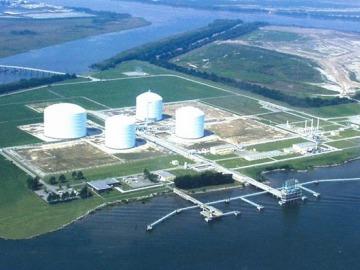
Section Branding
Header Content
LNG Terminal Waits For Decision
Primary Content

The Obama administration is expected to move quickly this year on approving exports of liquefied natural gas, including from a terminal on Georgia's coast.
The proposal could bring the country cash but cause prices to rise.
The developing world is hungry for energy and the US has it in natural gas.
The market is being opened up by a process called hydrofracking.
There is a liquefied natural gas facility at Elba Island near Savannah which could export it.
Project critic Gordon Matthews says foreign buyers will make the commodity more expensive.
"It's been imported in the United States, which lowers our prices here," Matthews says. "If it's exported, it seems to me, it has to increase our prices here."
The US Energy Information Administration predicts exporting natural gas will cost end-users like home-owners and businesses an average of between 3% and 18% more, depending on a number of scenarios, over ten years.
But Bill Cooper of the industry-friendly Washington, D-C based Liquified Natural Gas Center says the increase will be offset by foreign cash.
"You're bringing new money into the economy from outside of that economy and that's always a good thing," Cooper says. "It has an overall net economic benefit to the country because with exports you're bringing that money back into the United States."
Southern LNG says its proposed export terminal could create more than 400 jobs adding $20 million to the economy.
A federal report issued last month on the economic effects of exporting LNG could hasten an administration decision.
Tags: Savannah, Obama administration, orlando montoya, Elba Island, liquefied natural gas, LNG, Southern LNG, fracking, Gordon Matthews, Bill Cooper, US Energy Information Administration, hydrofracking, energy prices
Bottom Content
